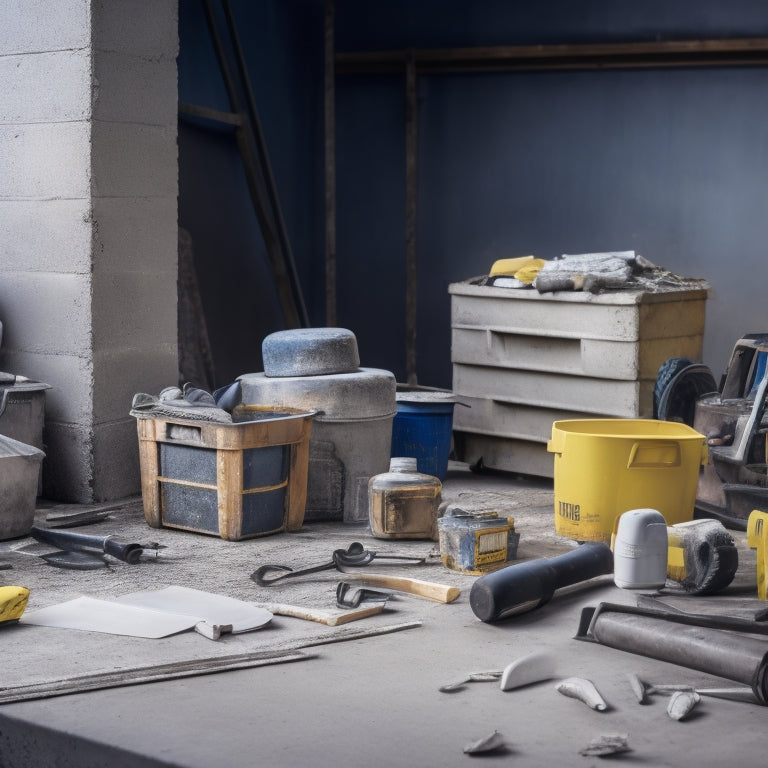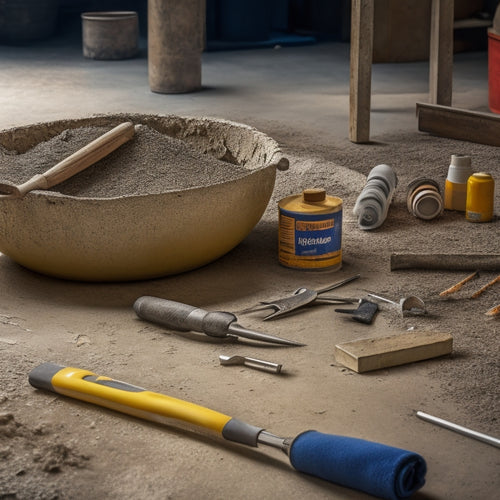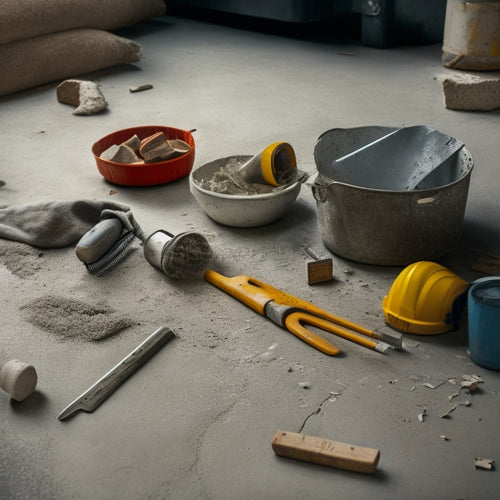
Renting Tools for Concrete Block Coating on a Budget
Share
When renting tools for concrete block coating on a budget, prioritize eco-friendly options, like manual sprayers for small projects and mechanical sprayers for larger ones. Choose rental companies that provide well-maintained equipment and thorough training. Verify you have the essential tools for surface preparation, such as wire brushes and pressure washers, and consider specialized coatings and application techniques for a professional finish. By weighing the costs and benefits of renting versus buying, you can stay within your budget. Now, take the next step to transform your concrete blocks into a stunning, durable, and cost-effective finish that meets your project's unique needs.
Key Takeaways
• Rent manual sprayers for small to medium-sized projects to minimize waste and emissions while staying within budget.
• Choose rental companies that provide well-maintained equipment and thorough training for efficient and effective coating application.
• Prioritize eco-friendly tools made from recycled materials or with energy-efficient designs to reduce environmental impact.
• Consider renting mechanical sprayers for larger projects to enhance efficiency and speed while saving on labor costs.
• Evaluate daily rental rates, additional fees, and equipment features to make an informed decision that aligns with your project needs and budget.
Budget-Friendly Sealing Tool Options
When coating concrete blocks, you'll need a reliable sealing tool to guarantee a professional finish. Fortunately, there are budget-friendly options available that won't break the bank. As a cost-conscious contractor, you're likely looking for affordable options that don't compromise on quality.
Look for eco-friendly tools that are designed with sustainability in mind, such as those made from recycled materials or with energy-efficient designs.
Some affordable options to contemplate include manual sprayers, which are perfect for small to medium-sized projects. These tools aren't only budget-friendly but also environmentally friendly, producing minimal waste and emissions.
For larger projects, you may want to contemplate renting a mechanical sprayer, which can help you complete the job quickly and efficiently. Be sure to choose a rental company that offers well-maintained equipment and provides thorough training on its use.
Concrete Block Coating Methods
When you're preparing to coat your concrete blocks, you'll need to take into account three key aspects: block surface preparation, coating material options, and application techniques.
You'll need to guarantee your block surface is clean and even.
Next, select the right coating material for your project.
Finally, choose the best application method to achieve a smooth, uniform finish.
Block Surface Preparation
Block Surface Preparation
To guarantee a strong bond between the concrete block and the coating, you must thoroughly clean and prepare the block surface, removing any dirt, oil, or old adhesives that may interfere with the coating's adhesion.
Surface cleaning is a critical step in block surface preparation. You'll need to remove any loose debris, dirt, or oil using a pressure washer or a wire brush. Next, you'll need to assess the block's surface to identify any cracks, holes, or other defects that may require repair.
| Task | Tools Needed |
|---|---|
| Remove loose debris | Broom, dustpan |
| Remove dirt, oil, or old adhesives | Pressure washer, wire brush |
| Assess block surface | Visual inspection, flashlight |
| Repair cracks, holes, or defects | Epoxy-based patching compound, trowel |
Coating Material Options
With your block surface properly prepared, you can now select a suitable coating material to achieve the desired appearance and level of protection for your concrete blocks. You have several options to choose from, each with its own unique characteristics and benefits.
If you're looking for an eco-friendly solution, consider using water-based or plant-based coatings that are free from harsh chemicals and toxins. These coatings aren't only gentle on the environment but also provide excellent durability and resistance to weathering.
For added protection, you can opt for advanced sealants that penetrate deep into the block's pores, providing a strong barrier against water, salt, and acid damage. These sealants are ideal for blocks exposed to harsh weather conditions or those used in high-traffic areas.
Additionally, you can choose from a range of specialized coatings, such as epoxy-based or polyurethane-based coatings, that offer superior strength, flexibility, and UV resistance.
Whatever coating material you choose, make sure it's compatible with your block type and intended use to guarantee ideal results. By selecting the right coating material, you'll be able to achieve a durable, long-lasting finish that meets your specific needs and budget.
Application Techniques
You'll need to choose the right application technique to guarantee a uniform, even coat that adheres properly to your concrete blocks. The two most common methods are roller application and brush technique.
Roller application is ideal for large, flat surfaces and can cover a lot of ground quickly. It's also great for achieving a textured, rough finish. However, it can be tricky to get into tight spaces and may leave behind roller marks.
On the other hand, the brush technique provides more control and precision, making it perfect for cut-ins, corners, and edges. It's also better suited for achieving a smooth finish. When using a brush, you'll need to work in small sections, applying thin, even coats to avoid drips and runs.
Regardless of the method you choose, make certain to follow the manufacturer's instructions and take necessary safety precautions. Additionally, consider the type of coating material you're using, as some may require specific application techniques.
Essential Tools for Sealing Cinder Blocks
When sealing cinder blocks, you'll need to prepare the surface properly and apply the sealant correctly to guarantee a durable and effective coating.
You'll require specific tools for these tasks, including those for cleaning and roughening the block surface, as well as for applying the sealant evenly and efficiently.
Block Surface Preparation
Before applying a concrete block coating, scrape off dirt, grime, and old sealers from the block surface using a stiff-bristled brush or a wire scrub brush to guarantee a strong bond between the block and the new coating.
This essential step guarantees the new coating adheres properly, preventing peeling or flaking.
As you prepare the surface, employ effective surface cleaning techniques, such as power washing or using a degreaser, to remove stubborn stains and oils.
Additionally, perform a block moisture assessment to determine the level of moisture in the blocks. This is critical, as excess moisture can compromise the coating's performance.
You can use a moisture meter or perform a simple water absorption test to assess the block's moisture level. By doing so, you'll be able to select the appropriate coating and application method for your specific project.
Remember to also inspect the blocks for any cracks or damage, and fill them with a patching compound before applying the coating.
Sealant Application Methods
With the block surface properly prepared, you're now ready to apply a concrete block coating using the right tools and techniques.
When it comes to sealant application methods, you have two primary options: spray techniques and roller application.
For large areas or complex surfaces, spray techniques are often the most efficient choice. Rent a high-pressure sprayer or a low-pressure sprayer with a wide fan tip to achieve a uniform coat. Make certain to maintain a consistent distance from the surface and move in a steady, back-and-forth motion.
For smaller areas or more precise applications, roller application may be a better fit. Use a high-nap roller cover to guarantee good coverage and minimize drips. Work in sections, applying the sealant in a 'W' or 'M' pattern to prevent puddling.
Regardless of the method you choose, always follow the manufacturer's instructions for application rates, drying times, and recommended thickness.
Renting Vs Buying Coating Equipment
You'll need to weigh the costs and benefits of renting versus buying coating equipment to determine which approach best suits your concrete block coating project's specific needs and budget. A thorough cost analysis is essential to make an informed decision.
When you buy coating equipment, you'll need to assess the upfront costs, maintenance expenses, and storage requirements.
On the other hand, renting coating equipment offers several benefits, including lower upfront costs, reduced storage needs, and access to specialized tools without a long-term commitment.
Rental benefits also extend to reduced maintenance responsibilities, as the rental company typically handles equipment servicing and repair. Additionally, renting allows you to try out different tools and techniques without a significant investment.
Sealing Tool Rental Cost Breakdown
When evaluating the cost-effectiveness of renting sealing tools, it's crucial to understand the breakdown of rental costs to accurately estimate your project's expenses. You'll want to take into account the daily or hourly rental rates, as well as any additional fees for delivery, maintenance, or equipment damage.
Here's a breakdown of typical sealing tool rental costs:
| Rental Service | Daily Rental Rate |
|---|---|
| Local Hardware Store | $20-$50 |
| Specialized Rental Company | $50-$100 |
| Online Rental Platform | $30-$70 |
Keep in mind that these rates may vary depending on the specific sealing tool features you require, such as spray nozzles or extension wands. When comparing rental services, reflect on the overall value they offer, including the quality of their equipment, customer support, and flexibility in their rental terms. By carefully evaluating these factors, you can make an informed decision that meets your project's needs and budget.
Cinder Block Preparation Tools Needed
To guarantee a strong bond between the concrete block and the coating, prepare the cinder block surface by gathering essential tools, including a wire brush, pressure washer, and cleaning solution. You'll want to remove dirt, grime, and old coatings to expose the raw surface, which is where these tools come in.
Here are the must-haves for cinder block preparation:
-
Wire brush: Scrub the surface to remove loose debris and roughen the surface for better coating adhesion.
-
Pressure washer: Blast away dirt and grime with high-pressure water, ensuring a clean surface for coating.
-
Cleaning solution: Apply a specialized solution to remove oils and other substances that may interfere with coating adhesion.
Spray Gun Rental for Efficient Coating
Renting a spray gun specifically designed for concrete block coating is crucial for achieving an efficient and uniform application. You'll want to choose from two main spray gun types: airless and air-assisted airless.
Airless spray guns are ideal for large, flat surfaces, while air-assisted airless guns provide a finer finish and are better suited for smaller, more intricate areas. When renting a spray gun, verify it's properly maintained to prevent clogs and uneven coating. Regularly clean the gun's nozzle and filter, and always follow the manufacturer's maintenance tips.
Before starting your project, conduct a test spray to verify the gun is functioning correctly and make any necessary adjustments. During application, maintain a consistent distance from the surface and move the gun in a steady, back-and-forth motion to achieve an even coat.
Additional Tools for a Polished Finish
Your concrete block coating project demands more than just a spray gun to achieve a polished finish; you'll also need a few specialized tools to refine the application process and guarantee a professional-looking result.
To ascertain a flawless finish, consider renting the following additional tools:
-
Microfiber rags: These are essential for wiping away excess coating material and preventing drips and runs. Look for high-quality, lint-free rags that won't leave behind fibers or streaks.
-
Finishing brushes: These brushes are designed specifically for concrete block coating and feature soft, flexible bristles that help smooth out the finish. They're ideal for cutting in around edges, corners, and other tight spaces.
-
Polishing pads: For a high-gloss finish, you'll need polishing pads with varying grit levels. These pads help remove imperfections and create a smooth, even surface.
Frequently Asked Questions
Do I Need to Clean the Tools Before Returning Them?
When returning rented tools, you're likely wondering if cleaning is necessary.
The answer lies in the rental agreements you signed. Check the fine print for specific cleaning procedures outlined by the rental company.
If none are mentioned, it's best to err on the side of caution and give the tools a good cleaning to avoid any potential fees.
This guarantees you're meeting your contractual obligations and maintaining a positive relationship with the rental company.
Can I Rent Tools for a Small Concrete Block Project?
You're about to commence a small concrete block project, and you're wondering if renting tools is a viable option.
Imagine a well-oiled machine, where every piece falls into place - that's what you'll get with the right tools.
For a small project, renting is a cost-effective way to access essential tools without breaking the bank.
You can find affordable rental options for the must-haves, like mixers, trowels, and saws, without sacrificing quality or efficiency.
Are There Any Discounts for Long-Term Tool Rentals?
When you're planning a project that requires tools for an extended period, you'll want to explore long-term savings options.
Many equipment rental companies offer discounts for long-term rental agreements. You'll typically need to commit to a minimum rental period, which can range from a few weeks to several months.
Be sure to review the rental agreement carefully, as the terms and conditions may vary.
Can I Use My Own Trailer to Transport Rented Tools?
You'll need to check the trailer regulations in your area before using your own trailer to transport rented tools.
Review the rental agreements carefully to make certain you're allowed to use your own trailer. Some rental companies may have specific requirements or restrictions on trailers, so it's crucial to clarify this before hauling away.
Additionally, verify your trailer meets the necessary safety standards to avoid any potential liabilities.
Is Tool Rental Insurance Optional or Mandatory?
You're about to start a tool-renting adventure, and suddenly, insurance becomes the ultimate party crasher! But don't worry, it's not as dramatic as it sounds.
When renting tools, you'll often be asked if you want to opt-in for insurance coverage. The good news is that it's usually optional, but highly recommended.
Think of it as a safety net that safeguards you against equipment damage or loss. By adding insurance to your tool rental benefits, you'll enjoy peace of mind and protection from unexpected costs.
Conclusion
You've made it to the final step of renting tools for concrete block coating on a budget. By now, you've learned that renting essential tools like spray guns and pressure washers can save you money and guarantee a professional finish.
Curiously, did you know that the global concrete sealers market is expected to reach $1.4 billion by 2025?
With the right tools and techniques, you can capitalize on this growing trend and achieve a durable, polished finish without breaking the bank.
Related Posts
-

Top Tools for Repairing Cracked Concrete Surfaces
When tackling a cracked concrete surface repair, you'll need the right tools to guarantee a durable fix. Start with e...
-

Top 10 Concrete Repair Tools for Small Fixes
You'll need the right tools to tackle small concrete repairs efficiently and effectively. When it comes to small fixe...
-

Free Design Tools for Concrete House Planning
You can kick-start your concrete house planning project without breaking the bank, as there are several free design t...


